Blog post by Oxfam Pilipinas
More from Oxfam Pilipinas

In the Philippines, Oxfam, together with our local partners, are providing immediate aid and support to the most affected communities in areas affected by Covid-19 in Eastern Samar, armed conflict in Mindanao, and the succession of destructive typhoons in October and November 2020 that battered Luzon Island.
These stories are from the communities in which Oxfam and partners provide emergency shelter, safe water, sanitation, and hygiene (WASH), multi-purpose cash transfer, food, gender and protection support. These snapshots from across the Philippines spotlights how some of the people we work with are spending the holiday season, how #Covid19 has impacted their lives, and what their hopes are for 2021.
Christmas is the spirit of ‘bayanihan’
Julie Ann Durana, Portfolio Associate for Cash Transfer and Financial Inclusion, Oxfam Philippines

“Christmas is all about giving and sharing. Christmas is the Filipino spirit of ‘bayanihan’ (communal unity).
I saw this first hand a few weeks ago in Barangay San Isidro, identified as the community most heavily affected by Super Typhoon Goni in Virac, Catanduanes.
I was part of the technical assessment teams from Oxfam and local partner People’s Disaster Risk Reduction Network, Inc. in Catanduanes. Earlier in November, the typhoon left over 2 million people affected in the region. There was about PhP 12 billion (USD 240 million) worth of infrastructure damage, including more than 170,000 houses. It got me thinking about how ten and thousands of families will cope with the holiday season fast approaching.
Together with our Sanitation Engineer, we worked with village leader Maundy Vales to inspect deep well hand pumps and find the ideal location for water bladders to deliver safe water to the community.
The community water pump was damaged, and the villagers looked forward to having safe water to drink, cook food with, and wash clothes. It was inspiring to see community members coming together to build the water bladder platform.
The volunteers’ joy as they selected and carried the coconut lumber to construct the platform was contagious. People were smiling as they worked together. I asked Elizabeth, a long time resident, why this was so.
‘I smile because I am strong, and I have to be strong for my children because they have big dreams. They inspire hope that we will have a brighter future ahead,’ she said to me.”
Let’s be kind to one another
Maria Lorena Dagatan, Philippine Rural Reconstruction Movement

“In the coastal municipality of Quinapondan, Eastern Samar, COVID-19 cases were rising swiftly. Rolly Diangzon, 42, had no choice but to continue working at a metal fabricating shop to support his family.
Nothing could have prepared him for what happened next.
One day, a nurse visited his home and told him that he was identified as a Person Under Monitoring (PUM) after having close contact with a COVID-positive person. He was advised to undergo 21 days of mandatory isolation in a quarantine facility. This would be the longest time Rolly, a solo parent, would be ever away from his kids.
The first few days of isolation were tough, and Rolly was filled with worry. As the sole breadwinner, he agonized over the high costs of medicines and what would become of his children’s future – who will take care of them if anything happened to him?
“I fought all my fears and anxieties through my deep faith in God,” said Rolly. He kept in contact with his children through a social media platform, which helped him cope with the loneliness of isolation.
Three days later, he took a swab test, which came back negative a few days later. This allowed him to return home and self-quarantine for two weeks.
Rolly is now safely back with his family, where they can spend the holiday season together. “I am very grateful to my children, and also the local government for their prompt action to stop the spread of COVID-19 here in our community,” he said. He encourages people not to discriminate or ostracize people who have or are suspected of having COVID-19.
“These are tough times. Let us break the stigma and be kind to each other,” he said.
Caring for others, now and into the future
Abie Ayao, Emergency Response Officer, Oxfam Philippines

“Caring for others, now and into the future,” as shared by Abie Ayao, Emergency Response Officer, Oxfam Philippines:
“It may be the holiday season in the Philippines, but in many parts of the country, displaced families continue to be forced out of their homes and cannot easily access food and safe water. They are trapped between the threats of violence and the virus.
The second week of December brought me and the Emergency Team, composed of partners from Community Organizers Multiversity – CO Multiversity and IDEALS, Inc., to South Upi in Maguindanao because of reports of new displacement due to harassment and armed conflict.
We traveled to provide life-saving assistance to displaced Lumad, who are Indigenous Peoples from Southern Mindanao. Heavy rains from the last three days have made the long trek ahead even harder for the Team – but, at the back of our minds, we knew it would be much harder for the 258 displaced Lumad families are also dealing with the threat of Covid-19. The thought of reaching them motivated every step we took.
After traveling for 25 kilometers from town center via van, and then walking for five more hours from the village center, we finally reached the temporary evacuation site. We delivered food, sleeping kits, and hygiene items, which the families have identified as their most urgent needs.
For me, December is a time to give back, reflect, and be there for others. With the Covid-19 pandemic, this is needed more than ever. May we all remember that each time we care for one another, we take one step forward in making our community a much better place.”
Christmas means sharing ourselves with others
Mark Saludes, Case Story Writer, Oxfam Philippines

“When I first met Annalyn Consulta, 28, she was appealing for aid by a roadside. Her upland village was devastated by the series of typhoons that battered the region since the start of November, the most devastating of which was Super Typhoon Goni. Together with more than 30 people, Annalyn leaves their community in Bariis village in Tiwi town, Albay province, at dawn to reach the main road before they miss a potential relief distribution.
According to Annalyn, they have to pass through towering piles of rocks and walk on rough mountainous terrain for more than an hour. Their journey begins at daybreak with empty stomachs, and thoughts of her children help Annalyn power through.
Along the main road, a community of Indigenous people called the Agta-tabangnon regularly share their food and shelter with Annalyn and the Bariis villagers. I was able to see ‘kapwa’ culture being lived out, which has been loosely translated as “sharing oneself with others,” even with those we do not know. The Agta-tabangnon shared what little they had willingly and without hesitation. Sacks of rice would be divided in half with Annalyn and her community whenever the latter could not secure relief goods or donations for the day.
This touching exchange validated my decision to continue the work that I do as a storyteller because it allows me to share these stories of communal care and empathy with the entire world. I hope this story reaches those who have the extra resources to help. May they be inspired by the depths of compassion and humanity that exists amid hardships and shared struggles.”



